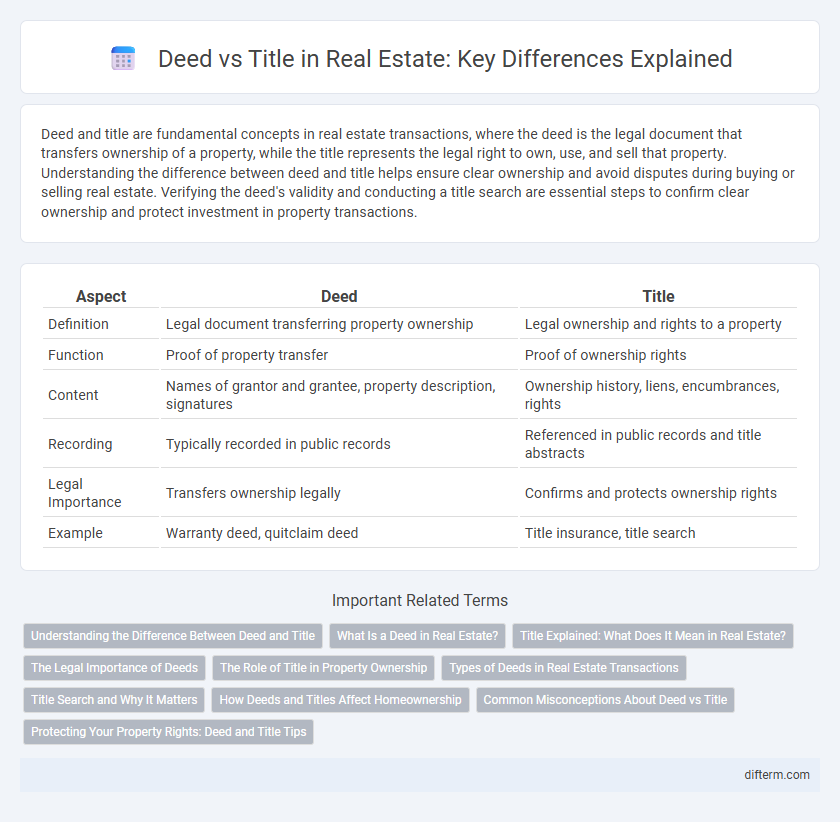Deed and title are fundamental concepts in real estate transactions, where the deed is the legal document that transfers ownership of a property, while the title represents the legal right to own, use, and sell that property. Understanding the difference between deed and title helps ensure clear ownership and avoid disputes during buying or selling real estate. Verifying the deed's validity and conducting a title search are essential steps to confirm clear ownership and protect investment in property transactions.
Table of Comparison
| Aspect | Deed | Title |
|---|---|---|
| Definition | Legal document transferring property ownership | Legal ownership and rights to a property |
| Function | Proof of property transfer | Proof of ownership rights |
| Content | Names of grantor and grantee, property description, signatures | Ownership history, liens, encumbrances, rights |
| Recording | Typically recorded in public records | Referenced in public records and title abstracts |
| Legal Importance | Transfers ownership legally | Confirms and protects ownership rights |
| Example | Warranty deed, quitclaim deed | Title insurance, title search |
Understanding the Difference Between Deed and Title
A deed is a legal document that transfers ownership of real estate from one party to another, serving as proof of the transaction. Title refers to the legal right to own, use, and control the property, representing the owner's bundle of rights. Understanding the distinction between deed and title is crucial for verifying ownership and ensuring clear property transfer during real estate transactions.
What Is a Deed in Real Estate?
A deed in real estate is a legal document that transfers ownership of property from one party to another, serving as proof of the transaction. It includes essential details such as the names of the grantor and grantee, a description of the property, and the signatures of involved parties. Unlike a title, which represents the owner's legal right to the property, a deed is the physical evidence confirming the transfer of that right.
Title Explained: What Does It Mean in Real Estate?
A title in real estate represents the legal ownership of a property, detailing the rights to use, control, and transfer the asset. Unlike a deed, which is the physical document transferring ownership, the title is an abstract concept that confirms who holds legal ownership. Understanding the title is crucial for verifying clear ownership and ensuring there are no liens, encumbrances, or legal disputes affecting the property.
The Legal Importance of Deeds
Deeds serve as the primary legal documents that transfer ownership of real estate, providing a clear, written record of the transaction essential for establishing property rights. Unlike titles, which represent the concept of legal ownership, deeds physically convey ownership from the grantor to the grantee and must meet specific legal requirements to be valid. Recording a deed in public land records protects the buyer's interest by publicly acknowledging the transfer and helping prevent disputes over property ownership.
The Role of Title in Property Ownership
Title represents the legal ownership of a property, establishing the owner's rights and interests in the real estate. Unlike a deed, which is the physical document used to transfer property ownership, the title signifies the actual ownership status and any encumbrances or liens affecting the property. Clear title ensures the owner has valid and undisputed rights, enabling secure transactions and protection against claims.
Types of Deeds in Real Estate Transactions
Warranty deeds, quitclaim deeds, and special purpose deeds represent the primary types of deeds in real estate transactions, each serving distinct roles in transferring property ownership. Warranty deeds guarantee clear title and protect the buyer against future claims, while quitclaim deeds transfer ownership without warranties, often used between family members or to clear title issues. Special purpose deeds, such as executor's or sheriff's deeds, are utilized in specific legal or court-ordered transactions, ensuring proper transfer under unique circumstances.
Title Search and Why It Matters
A title search is a critical process in real estate that involves examining public records to verify the legal ownership and any liens or claims on a property. Unlike a deed, which is the document transferring ownership, the title represents the actual rights to the property, making a clear title essential for a valid sale. Conducting a thorough title search prevents future disputes and ensures the buyer receives undisputed ownership.
How Deeds and Titles Affect Homeownership
Deeds legally transfer property ownership from seller to buyer, serving as the official document recorded in public records, while titles represent the legal rights and interests a person holds in that property. Clear titles ensure homeowners have undisputed ownership and the ability to sell, mortgage, or lease their property, whereas flaws in the title can result in legal disputes or claims from third parties. Understanding the distinction and ensuring a clean deed and title protect homeowners' investment and provide security in real estate transactions.
Common Misconceptions About Deed vs Title
Many property owners mistakenly believe that a deed and title are interchangeable terms, but a deed is the legal document that transfers ownership, while the title represents the actual ownership rights. Another common misconception is that holding a deed guarantees clear ownership, yet title issues such as liens or disputes can still exist without being reflected on the deed. Understanding this distinction is crucial for resolving property claims and ensuring a secure real estate transaction.
Protecting Your Property Rights: Deed and Title Tips
Understanding the differences between a deed and a title is crucial for protecting your property rights in real estate transactions. A deed serves as the legal document that transfers ownership, while the title represents the actual legal ownership and rights to the property. Always ensure the deed is properly recorded and conduct a thorough title search to prevent future disputes or claims against your property.
Deed vs Title Infographic

 difterm.com
difterm.com